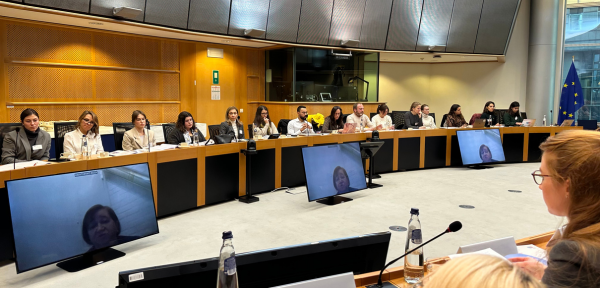Zero Project Awardee Spotlight: Key Achievements of the ECDUR Project

In December 2023, the Emergency Early Childhood Development Support for Ukrainian Refugees (ECDUR) Project ended. The result of a partnership between EASPD and the United Nations Children's Fund (UNICEF) with the financial support of the US Government, the project was launched in July 2022 as an emergency response to the full-scale war on Ukraine. The efforts of the project to increase the availability of trained Family Consultants who can deliver Early Childhood Development and Intervention support to families with children at risk of, or with developmental difficulties, were recently recognised by the Zero Project’s 2024 Awards.
This week, project partners are present in Vienna, Austria, to receive their Zero Project Award alongside the 76 other awardees. The Awards marked a moment to celebrate the key achievements of the project. In particular, over the course of the 18-month project, partners trained 545 Family Consultants and 577 Parental Peer Support Facilitators who went on to provide direct support to 20,441 children with, or at risk of developmental difficulties, including disabilities and their families. Working locally the project developed the capacity and expertise within the Ukrainian community to respond to the increasing demand for support by displaced families and when needed matched families with social support services in the host countries. Feedback from those involved in the project has praised the project for providing essential support to families and empowering the Ukrainian refugee community. Sharing their experiences in the project one Family Consultant said"Even though we are in a foreign country, we are not alone here. With us are people who always extend a helping hand, advise, and guide us in the right direction".
Implemented in Bulgaria, Moldova Poland, Romania and Slovakia the project not only delivered emergency support to refugee Ukrainian families but also contributed to system strengthening for the provision of Early Childhood Intervention (ECI) services in four of the countries. This work resulted in four National assessments, providing an in-depth overview of the national capacity to respond to the needs of young children at risk of or with disabilities, developmental delays or behavioural challenges, including children coming from Ukraine. The reports provided further information on the status of the national ECI policy framework and service provision and also outlined key challenges to system development. Following the reports national partners worked with key experts at a local level to develop national policy recommendations for the development of comprehensive ECI systems which can support all families.
Beyond its work locally the project also made an impact at a European level, as evidenced by its successful engagement in key international events. The International Conference ‘Family-centred Early Childhood Intervention: How to Make it Work’ attracted over 300 participants, fostering dialogue and commitment to improving ECI practices on both national and international fronts. The key conclusions of the conference were further shared with policymakers at an international high-level event in the European Parliament, with speakers from the European Parliament and Commission, the Ministries of national governments, and leading European NGOs. The event aimed to encourage the greater commitment of policymakers and was attended by 43 people in person and 65 people online. To read more about the conclusions of this event, click here.
To further amplify its advocacy efforts, the project developed a Position Paper titled “Early Childhood Intervention in the Context of Displacement” which was widely shared among over 100 relevant stakeholders on the EU and national level, including European Parliament and Commission officials, international organisations, international civil society umbrella organisations, national officials and NGOs, ECI experts and practitioners, academia, etc.
While the ECDUR project has ended the emergency situation has not and further funding is needed to close the provide essential support in the long term. Moving forward EASPD hopes that the ECDUR model can be replicated in other emergency intervention initiatives in disability and other sectors, as it proved to be very useful and inclusive according to the national project partners. EASPD will continue to put ECI on the forefront of the political agenda in the EU and beyond.
Note to editors
The Emergency Early Childhood Development Support for Ukrainian Refugees (ECDUR) Project is the result of the United Nations Children's Fund’s (UNICEF) Regional Office in Geneva, EASPD and six national partners. These national partners include Keystone Moldova (Moldova), Imago Foundation (Poland), National Network for Children (Bulgaria), The Social Teahouse (Bulgaria), TENENET (Slovakia), FONSS (Romania). Implemented between July 2022 and December 2023 the proejct has delivered emergency early childhood development support to Ukrainian families with generous contributions from the U.S. Government.

